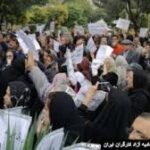
As oil workers engage in co-ordinated strike action across Iran, JANE GREEN considers the response of the Iranian regime and the prospects for trade unions in Iran
AN UNPRECEDENTED wave of strike action is under way in the gas and oil fields of Iran, as workers down tools over the late payment of wages, insecure employment contracts, poverty pay and intolerable working conditions.
Temperatures in Iran’s refineries can reach up to 50°C, a danger to health and almost impossible to work in.
An estimated 10,000 workers have been involved in unofficial strike action which has hit major refineries and industrial projects in Iran’s South Pars gas fields.
The strike has remained solid for over a week.
Localised protests have been common in recent years, as employers have squeezed pay and conditions in order to maximise profits, but the co-ordination of action, affecting a number of refineries and many contractors, is a new dimension.
The strike action was triggered when Ebrahim Arabzadeh, a contract worker at Mahshahr petrochemical complex, died from heat exhaustion at work on July 28.
His colleagues presented a list of demands to the contracting companies which were largely ignored.
As a result, by Saturday August 1, of the 10,000 workers on strike, 5,000 had abandoned the gas fields entirely and returned home.
Other remained in their dormitories, waiting for employers to give in to their demands.
Those on strike cover a range of trades including builders, electricians, welders and pipefitters, who work for employment agencies and gangmasters on a variety of industrial projects in the world’s largest natural gas field.
They work a shift cycle of 20 days on, 10 days off, and are housed in dormitories close to the workplace while on shift.
The action has seen hundreds of workers protesting outside the offices of the contractors, declaring their intention to refuse to work for an entire 20-day shift cycle.
IndustriALL Global Union’s Iranian affiliate, the Union of Mechanics and Metalworkers of Iran (UMMI), has to operate under restrictive conditions in which independent trade unions in Iran are not officially recognised by the regime.
In spite of this, UMMI is optimistic that, given the scale of the action, workers may have a chance to win concessions and possibly gain representation at major industrial sites.
UMMI is also confident that, as the strike continues, workers at other refineries and petrochemical complexes will join the action.
By August 4, protests had already spread to the Isfahan refinery in central Iran and Mashhad in the north-east.
Given the precarious state of the Iranian economy, the action may well force employers to the negotiating table.
A number of companies have started to message their workforce, saying that they will improve their pay and conditions if they return to work.
The power station in Iranshahr in south-east Iran is an example.
However, the workforce is standing firm and demanding agreement an all aspects of pay and conditions of service. The companies are showing signs of desperation.
The development of the South Pars fields is Iran’s flagship hydrocarbons project.
The economy depends on the project for foreign exchange as it experiences hyperinflation.
The significance of the fields is underlined by the fact that it is the state-run oil and gas company that has jurisdiction over all projects in South Pars.
Lost revenue therefore has a direct impact upon the beleaguered Iranian exchequer.
While this may augur well for a negotiated solution, the Iranian regime is not noted for conceding to workers’ demands and a long struggle may yet be ahead.
Organisers are already wary of retaliation by the security forces, a common tactic in Iran, as the strike spreads.
There are already reports of arrests and surveillance against key activists.
French energy giant Total signed a deal to develop the fields in 2017, but pulled out due to US sanctions.
The fields are being developed in partnership with other multinational energy companies, but Iran has struggled to raise the necessary financial commitment.
Contractors are under pressure to complete work on projects which are behind schedule, and often face liquidity problems due to delayed payments on government contracts due to banking sanctions.
International support will continue to be a crucial factor in sustaining the immediate action but also raising the profile of the struggle for wider trade union recognition in Iran.
IndustriALL assistant general secretary Kemal Ozkan recognised the scale of the task facing Iranian workers recently, stating: “Iranian workers have proved time and again that no amount of repression will silence them. They will stand up for their rights and continue to protest until their voice is heard.
“The workers in the gas fields are taking co-ordinated, strategic industrial action in defence of their rights.
“If they hold firm, they can win a substantial change. Iran will suffer industrial conflict until independent unions are recognised.”
Sources inside Iran have stressed the significance of the actions as this is the first time in the history of Iran’s labour strikes that contract workers in the country’s oil, gas and petrochemical industries have managed to organise strikes on such a scale.
Contract workers make up about 70 per cent of the total workforce in the sector, but are generally unable to organise such large-scale protests due to their dispersal across a range of companies and contractors.
The fears of the regime that the action could spread from economic to political demands were intensified recently when 14 independent organisations, from different social classes and spheres, issued a statement in support of oil, gas and petrochemical workers’ strike movement.
“A general strike is the only way” is the final sentence of this statement.
Trade union, human rights and solidarity organisations have been quick to respond to the action by the Iranian workers and show expressions of support and solidarity.
In Britain, the Committee for the Defence of the Iranian People’s Rights (Codir), has been at the forefront of leading calls for solidarity with the Iranian workers action and soliciting expressions of support from labour and trade union movement organisations.
Codir assistant general secretary Jamshid Ahmadi stressed the importance of messages reaching the workers in Iran and the need to expose the failure of the regime to recognise legitimate trade union activity, stating: “Once again, we see repression and arrest as the Iranian state’s response to workers making reasonable demands, given their totally unreasonable conditions of work.
“The rapid spread of this action is a reflection of the deep underlying dissatisfaction many workers in Iran feel, not only with their employment situation, but also with the government itself.”
Codir will continue with its campaign for immediate messages of solidarity and support with the oil workers currently on strike to be sent by trade unions in Britain.
Jane Green is a member of the executive council of Codir. For information on Iran please visit www.codir.net or write to codir_info@btinternet.com.












 Posted in
Posted in 











